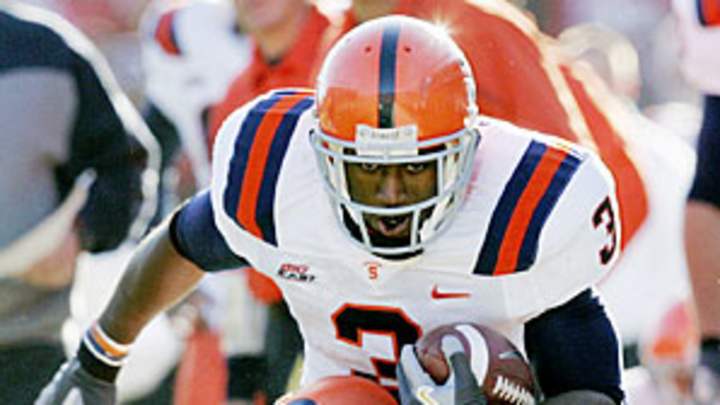NFL Rookie Watch: Delone Carter


No NFL team has gained fewer rushing yards the past two seasons than Indianapolis -- this despite the fact the Colts have mostly relied on a pair of former first-round running backs. The ground game has worked against the AFC's most feared passing attack, and it has puzzled the club's fanbase. With opponents so concerned with what Peyton Manning is doing, why can't the backfield move the football?
In April, the team used its fourth-round selection on Syracuse's Delone Carter. It's rare for mid-round picks to bring about such excitement, but in Indianapolis, where fans are desperate for an answer, some believe Carter is holding a golden ticket to the front of the depth chart. He's not exceptionally fast (4.54 in the 40-yard dash at the Combine) nor is his collegiate resume all that impressive (he finished third in Big East rushing his senior season) -- he's just an alternative to what hasn't worked for Indianapolis.
Before the draft, some analysts viewed Carter as a short-yardage specialist or as a potential complement to an established back. Others suggested he has more to offer. Said the NFL Network's Mike Mayock, "In a zone [blocking] scheme, a downhill, one-type guy, he could carry the ball 20 times a game."
Colts fans have their fingers crossed.
Dissecting the depth chart: This is really a three-horse race, with Joseph Addai expected to lead the pack entering camp. But, after gaining 1,000 or more yards in each of his first two seasons, Addai's numbers have plummeted due to injury and inconsistency. His performance last year (4.3 yards per carry) helped, but it wasn't enough to keep Indianapolis from shopping for a replacement. The team's 2009 first round pick, Donald Brown, has been a disappointment. In two seasons he's averaged 3.8 yards per carry. The team will allow Carter to compete with both backs, and if nothing else will look to the rookie to offer some help in short yardage and goal line situations.
Just the stats: As a senior, Carter carried the ball 18 or more times in eight of Syracuse's 13 contests and reached the 1,000-yard mark for a second straight season. He had nine 100-yard games in his final two seasons, including a 198-yard, MVP performance in the New Era Pinstripe Bowl. As a true freshman in '06, Carter racked up 713 yards (4.6 yards per carry) for the Orange. Against Wyoming that season he gained 129 yards and scored four touchdowns.
Projection for 2011: 220 carries, 975 rushing yards, 15 catches, 125 receiving yards, 7 TDs.
2010 rookie comparison: LeGarrette Blount
Both Blount and Carter are power backs who can handle the duties that come with being a featured back. By midseason last year, Blount was the Buccaneers' primary ball carrier and had become a driving force in Tampa Bay's push for a playoff spot. He was also the only rookie rusher to gain 1,000 or more yards. The same could be true of Carter this season.
Interesting fact that won't help you: Carter's position coach at Syracuse last year was former University of Michigan and New York Giants running back Tyrone Wheatley.
What he's worth: Carter is a bigger gamble than many of the other rookie running backs because there are two men separating him from the starting job in Indianapolis. It's also true that if he is successful, he probably will become the rookie delight of fantasy owners everywhere. When the Colts have relied on a single back, that player has been a top 15 fantasy talent.
In most drafts this summer, Carter shouldn't come off the board before the eighth round. If he pushes past Addai and Brown, he'll spend most of the season in your starting lineup; if he fails, he'll become expendable.
Mike Beacom is a contributing writer for FootballDiehards.com.
